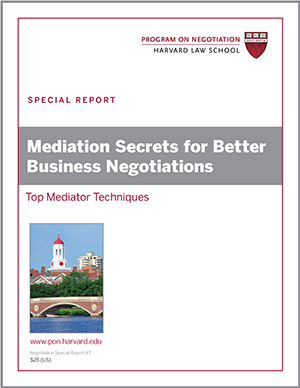
Is abrasiveness one of the qualities of a good mediator? That’s the question posed by to Francesca Gino, Tandon Family Professor of Business Administration at Harvard Business School. Here is the original question and Dr. Gino’s answer.
I work for a firm that distributes products in South America. In the past few months, we have been in a very heated conflict with a customer who claims we did not fill an order as specified by our five-year contract. My firm disagrees. Because we seem to be interpreting our contract differently, I suggested to my boss that we try mediation, and the customer agreed. But the mediator we are working with, to my surprise, seems rather abrasive and off-putting. I thought a warmer style might be one of the qualities of a good mediator. We would like to resolve this conflict quickly or go the arbitration route. Any advice?
Surprise! The qualities of a good mediator aren’t always what we’re expecting
Your desire to work with a mediator with a warmer style is understandable. Warm and friendly mediators are usually very effective at helping parties in conflict reach resolutions that are beneficial to each side. Such negotiators are good at expressing empathy with everyone’s viewpoint and building rapport to create a trusting atmosphere.
However, there may be a hidden benefit to working with a mediator with a more abrasive style in situations like yours, research I conducted with my colleagues Ting Zhang (Columbia University) and Michael I. Norton (Harvard Business School) suggests.
In our studies, we assigned our participants roles in a heated conflict or dispute with another party and gave them the opportunity to interact with a mediator. In one experiment, some faced a “nice” mediator—one who spoke in a friendly tone and asked questions politely, for example. Others faced a mediator who was more abrasive, spoke gruffly, and used sarcasm. Still others faced a mediator with a more emotionally neutral style. Across different types of disputes and situations, we found that negotiators were more willing and able to reach an agreement when working with an abrasive mediator than with a nice or neutral one. Why? Because the abrasive mediators became common enemies who brought the adversaries together.
If this seems counterintuitive, think of parents of quarreling siblings who find themselves shouting, “I don’t care who started it. Both of you, go to your rooms!” At first blush, this strategy may sound less effective in defusing sibling tensions as compared with a calmer approach. Yet as many of us have experienced, such stern treatment can unite siblings against their tyrannical parents and even lead them to play nicely together after being banished. Similarly, in our research, we found that abrasive mediators can positively influence negotiators’ motivation and ability to resolve conflict.
Consider Martti Ahtisaari, a world-renowned mediator and former president of Finland who was awarded the Nobel Peace Prize as well as the Program on Negotiation’s Great Negotiator Award. Ahtisaari has used a variety of techniques and styles to resolve disputes, including a style that those who have worked with him have characterized as stern and firm. “Perhaps a little bit of theatrics help in some situations,” Ahtisaari told the Christian Science Monitor in 2006. “I can probe them, nudge them forward, sometimes be fairly tough.”
As compared with sternness, it’s worth noting that a downright hostile style could come at a significant cost if it forges only a temporary truce between negotiators or upsets them to the point of walking away. But, given your time constraints, your best course of action at this point may be to stick with your current mediator. His or her abrasive style just might lead your counterpart to view you as an ally and promote an agreement.
Are there any qualities of a good mediator that you find surprising?




